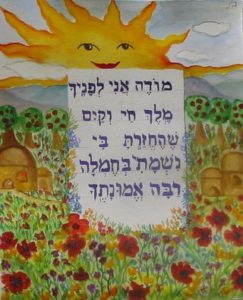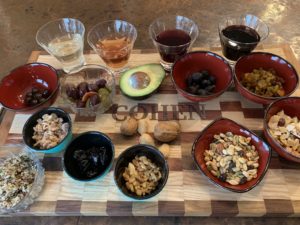Havdalah Concludes Shabbat, Ignites Our Senses
Many of us are wondering what will life be like post COVID pandemic—first and foremost, will we be alive? Will we be healthy, weak, relieved, scared, safe, ecstatic to have our freedom again? Will we continue to have a greater awareness of what is most important in life, not put as much emphasis on the daily grind, the hustle, the material things that bring only temporay satisfaction? Will we be more understanding, patient, empathetic, loving, and responsible for each other? After living in a bubble for so long, will we continue to live to our full potential, our higher purpose, and will we remember what it feels like to life each other up and that we are all in this together?
When Jewish people observe Shabbat they go through a similar transition on Saturday night when the stars come out and we prepare to re-enter the week, that transition from the holy to the mundane. Our body and soul has been renewed for the last 25 hours, will we carry this renewed energy and deeper sense of purpose into the work week? That is what Havdalah, a Hebrew word that means “separation,” is all about. This special ceremony concludes Shabbat and engages all of our senses so that we remember to carry that beauty forward.
Modei Ani, Giving Thanks Every Morning
If there is one thing we have learned from the daily, ongoing battle of the novel coronavirus, is that every day we are given is a gift. Some of us are perfectly healthy with no symptoms at all, others are feverish and quartantined in a separate room in the house, many are gravely ill and dying, with their families unable to be at their side. This mysterious, non-discriminating virus has made something very clear: Be grateful, everyday, for being alive.
Be grateful for Every. Single. Breath. Continue reading
After Darkness, There is Light. A Lesson When The Pandemic “Passes Over”
 “Why is this night different from all other nights,†will begin my 25-year-old son Jack sporting a thick, shaggy red beard, looking more like Rabbi Yankel. The last time he recited the Mah Nishtanah, the Four Questions, at our seder he was probably around bar mitzvah age. This Passover is different, in so many ways.
“Why is this night different from all other nights,†will begin my 25-year-old son Jack sporting a thick, shaggy red beard, looking more like Rabbi Yankel. The last time he recited the Mah Nishtanah, the Four Questions, at our seder he was probably around bar mitzvah age. This Passover is different, in so many ways.
Tonight, there are only three of us at the table.  My 21-year-old daughter Sari is away, living in her college town in Kansas while taking online classes and working in a local pharmacy in the thick of a pandemic. Even though I wrote an article on virtual seders HERE, and have learned some clever ways to social distance during a real life Passover plague, we chose to do our own service this year, just the three of us. I have a collection of Haggadahs, poems, and passages that we can use, and of course I prepared a full course meal, from matzo ball soup to chocolate macaroons. Hoping Sari will join us for the afikomen, at least.
World’s Chief Rabbis Call Us Home, It’s Shabbat HaGadol
‪Shalom Bayit, “peace in the home,†is a foundation of Judaism. And during this coronavirus pandemic when we are forced to stay in our home, this very principle can save lives.
Shalom Bayit in Hebrew means “peace in the home,” and this is what our world needs right now. These worst of times can bring out the best in us, our middot, good character traits, such as Peace, Harmony, Safety, Love, Nurture, Compassion, Empathy, Humor, Comfort, Forgiveness, Respect, Cooperation…this is what makes a house a home. Shalom bayit keeps us united, calm, and going strong under one roof, together. These important values are everything we yearn for during these times of uncertainty. We don’t have control over many things happening in our lives right now, but shalom bayit, we do. Right now, we have a shared purpose, and our actions directly impact others.
Shabbat. The Constant Among the Chaos
We made it another week. We found solace in ordinary things. Opened the windows, let the fresh air inside. White flowers burst on a dogwood tree, a red Cardinal bird perched on a branch hidden among the blossoms, contrasting with the color of the bright blue sky. Sidewalk chalk drawings of purple and pink hearts decorate a driveway. Everybody waving to each other, six feet apart.
We have a new routine for when Scott gets home from a long day of work at his food distribution company where he makes sure a chain of grocery stores are stocked with non-perishables, even single rolls of toilet paper. As soon as he walks in the door, he strips down to his undies, throws his clothes in the washing machine, pets our dog Beau who excitedly greets him with wagging tail and kisses, and finally showers before we spread out at the big round kitchen table and eat dinner together. We talk. We breathe. We drink warm water (supposedly one of the many remedies to lessen the chance of getting sick, who knows). Afterwards, if it’s not already dark, we take Beau for a walk. Continue reading
While Pandemic Separates Us, Shabbat Unites Us
“More than the Jews have kept Shabbat, Shabbat has kept the Jews.†Achad Ha’am Continue reading
The Hidden Meaning of Purim–The Happiest, Holiest Holiday!
 Purim is a celebration that is as rowdy and fun-filled with storytelling, gifts, costumes, charity, feasting, and trickery and plenty of L’chaims, as it is a serious dramatic holiday that teaches us how good overcomes evil and that things are now always what they seem to be. In other words, Purim is the happiest, holiest Jewish holiday of all.
Purim is a celebration that is as rowdy and fun-filled with storytelling, gifts, costumes, charity, feasting, and trickery and plenty of L’chaims, as it is a serious dramatic holiday that teaches us how good overcomes evil and that things are now always what they seem to be. In other words, Purim is the happiest, holiest Jewish holiday of all.
Tu B’Shvat Feast Celebrates Israel’s Birthday of Trees
Tu B’Shvat is considered a minor holiday in the Jewish calendar, sandwiched between Hanukkah and Passover, but that doesn’t make this “New Year for the Trees†any less meaningful and fun for your family to celebrate in its fruity, nutty, earthy glory.
Sukkot Celebrates Fall Harvest…And Much More
Now that Yom Kippur is over and the hard work is done, it’s time to get ready for the next Jewish holiday, Sukkot (Hebrew word for booths or huts),  a week-long harvest festival that begins Sunday night, five days after Yom Kippur.
The festival of Sukkot is one of the three great pilgrimage festivals—the others are Passover (April 8-16) and Shavuot (May 28-30). These holidays celebrate both agricultural festivals and historical events in the history of the Jewish people, when in ancient times Jewish people traveled to the Temple in Jerusalem. In Israel, Sukkot is a major holiday, no work, no school, and everyone is outdoors sharing meals, singing songs, and giving thanks for the bounty of another season.
Also known as the Feast of Tabernacles, Sukkot is like the American holiday Thanksgiving in that we give thanks for another season of crops that will sustain us, but it is so much more. Sukkot ranks right up there in important holidays because it commemorates the time when we received the Torah at Mount Sinai, were freed from slavery, and wandered the desert for 40 years to the Promised Land. Jews today are still on a journey, and holidays like Sukkot remind us to free ourselves from the material things that often keep us in bondage. It’s a time to detach from the comforts we are accostomed to inside our houses and reconnect with the natural wonders that sustain us inside a flimsly little hut called a sukkah (singular word for Sukkot). Continue reading
Yom Kippur–Holiest & Happiest Day of the Year
Tonight begins Yom Kippur, also known as the Day of Atonement, the holiest day of the year. Yom Kippur is a time for fasting, prayer, reflection, and repentance.
On Yom Kippur, more Jews pack the auditorium than any other time of the year, in fact, extra chairs are needed to accommodate the larger than usual crowds. Why? Is it because we have committed so many sins and need God’s forgiveness? Or because our Jewish guilt forces us to show up at temple least once a year (when actually joyous celebrations happen throughout the calendar)? Or is it because we want to see our friends and show off our new outfits? Or perhaps spending time in temple distracts us from our hunger pangs before we get to finally go home and break the fast with blintzes and bagels with creamed cheese.
While Yom Kippur is considered a solemn time with deep, genuine prayers, this high holiday is also the happiest day of the year. Think about it—Yom Kippur is all about opportunities and hitting the restart button, physically and spiritually. Through fasting, Yom Kippur is a time to detox (way before the body cleanse became a health trend), and it is a time to let go of baggage that has been weighing us down the previous year. Yom Kippur is a time to bow our heads in prayer, yes, but not hang our heads low because of past mistakes, failures, and shortcomings. Yom Kippur is a time to return to God who loves us no matter what and is pleased that we showed up, whether in a house of worship or in the apple orchard, or in our own minds.
If we are sincere in how we approach Yom Kippur, with an open mind, heart, and soul, willing to let go of the burdens that bring us down, forge ahead with a renewed sense of purpose, then Yom Kippur is a time to rejoice and begin a new year with a clean slate, a fresh start.
G’mar Hatima Tova, “May you be sealed in the Book of Life†for goodness, kindness, happiness, health and prosperity.








